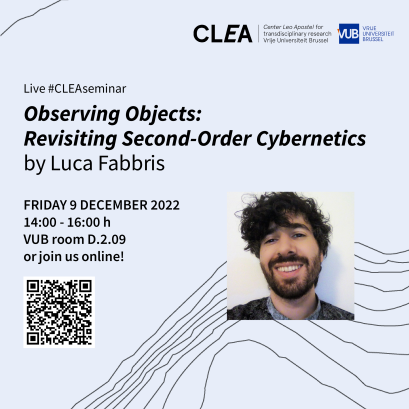What is an object that an observer can observe and what is an observer that can observe an object? This twofold question condenses the traditional approach – at the same time ontological and epistemological – to the problem of the theoretical foundations of the observing subject and the observed object, as well as the nature of their correlation. A major line in second-order cybernetics has generally dealt with the second part of the question: what is an observer that is capable of observing objects? By observing the observer’s operations and bracketing external reality, second-order cyberneticians consider objects the outcome – the construction – of observing systems’ operations. However, it is possible to pinpoint a different line in second-order cybernetics, that is, a minor line of thought that radically subverts the way in which the question is posed: What is an object that can observe an observer; and what is an observer that an object can observe? We can find this bizarre inversion at the core of Ranulph Glanville’s Theory of Objects, which is rooted in an ontology that takes observation as a primitive concept. Both objects and observers are considered as roles – or modes of existence – of an observation. In the perspectivist and animist Universe depicted by Glanville, only objects (intended as autopoietic units, points of view on themselves and other objects) exist. In his talk, Luca Fabbris will focus on some theoretical implications of this minor line that, despite its weirdness, allows to account for the operative autonomy of objects and, in so doing, offers a theoretical framework capable of combining object-oriented ontologies and process/action-oriented ontologies.
About the speaker
Luca Fabbris is a Ph.D. student in Theoretical Philosophy at the University of Turin (FINO Consortium) with a research project titled “Ontology of Self-Organizing Systems in Second-Order Cybernetics.” He is co-director of the book series BIT for the publisher Orthotes. He has co-edited the second Italian edition of Design for a Brain by William Ross Ashby and has published several articles about second-order cybernetics in Italian scientific journals (Aut Aut, Philosophy Kitchen, Noema, Azimuth, Kajak). He is co-editing an issue for Philosophy Kitchen on the legacy of cybernetics in contemporary philosophy.
Practical
The CLEA seminars are taking place simultaneously at the VUB campus in Etterbeek, Brussels, and online (via Zoom) and are open to everyone interested!
When. Friday December 9, 2022 from 14:00 until 16:00h
Where. VUB campus Etterbeek, room D.2.09.
Online. You can follow the seminar online via Zoom. You may need a Meeting ID and passcode to enter.
Zoom link: https://us06web.zoom.us/j/82757798426?pwd=em9sQlJDVjJYTEFRNk01dEJLWGxGUT09
Meeting ID: 827 5779 8426
Passcode: 122127
Video

